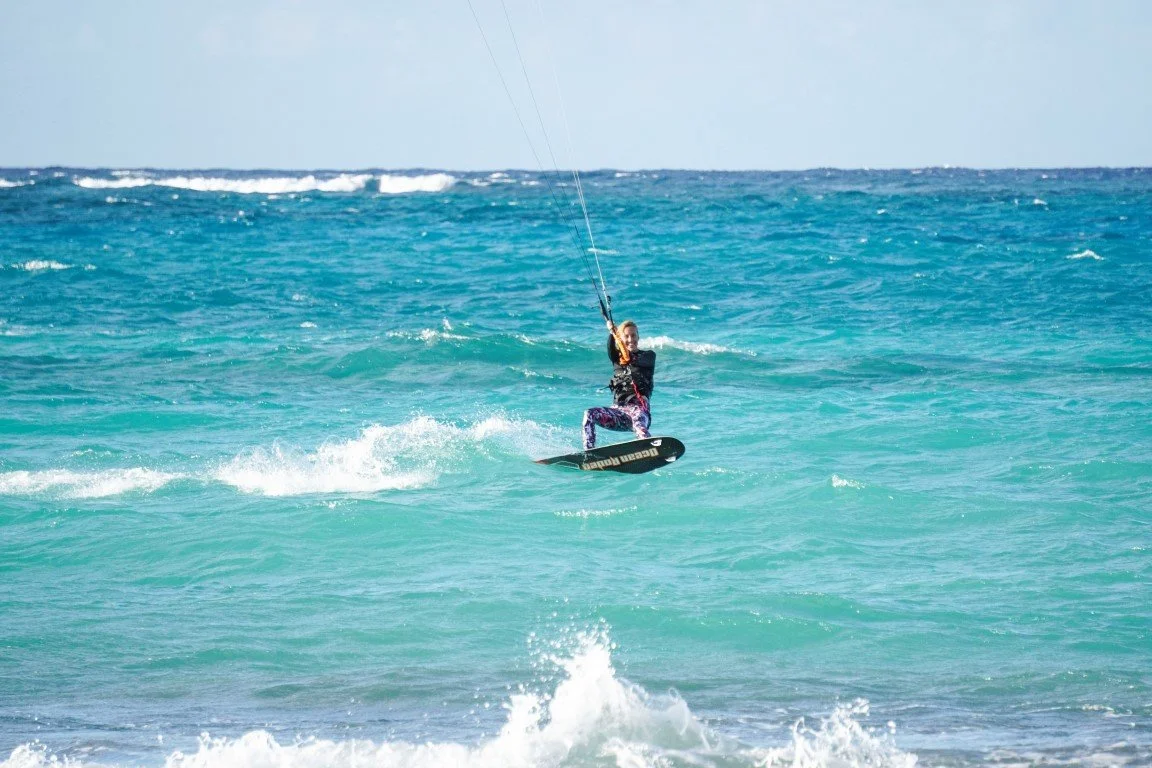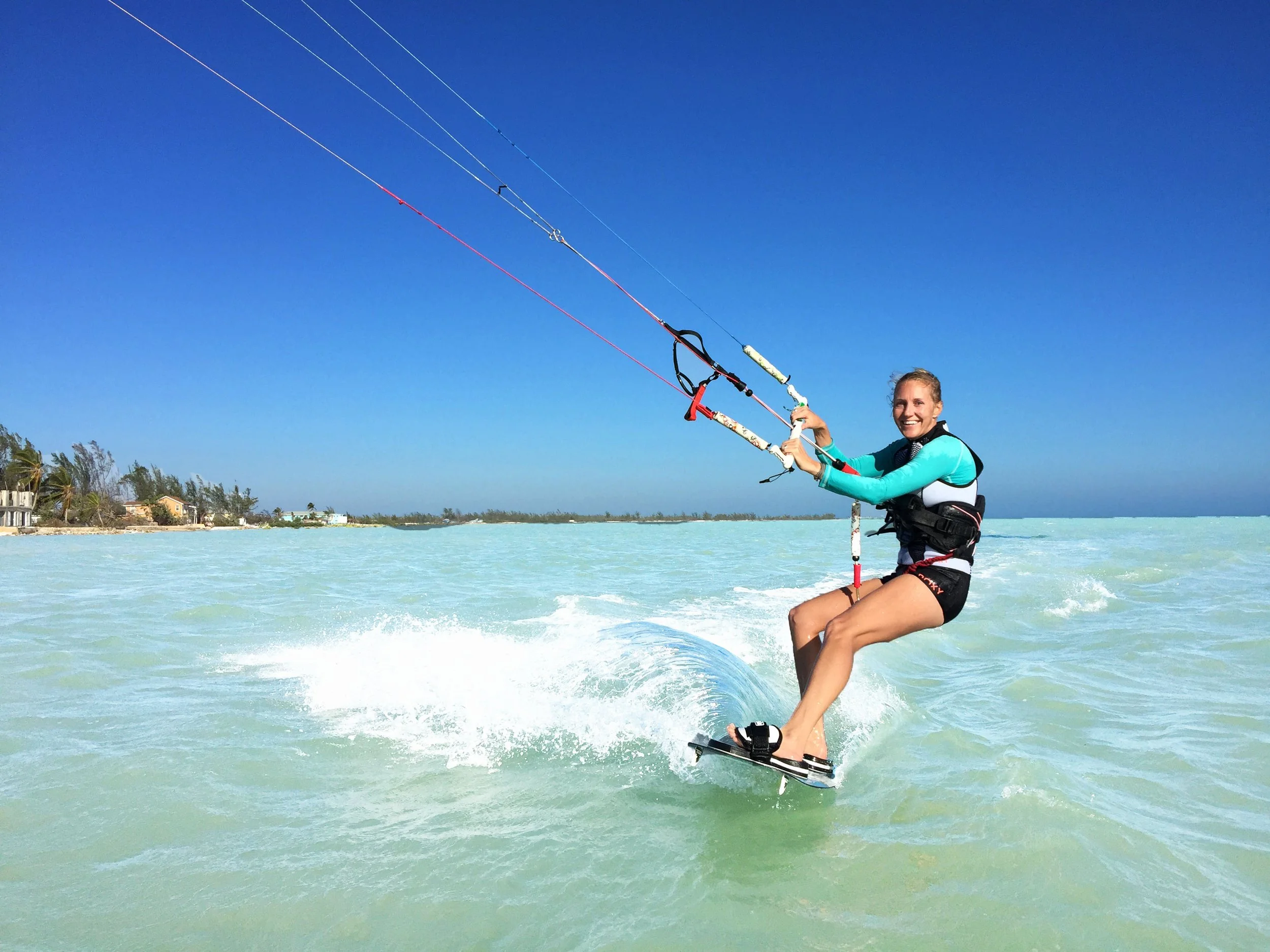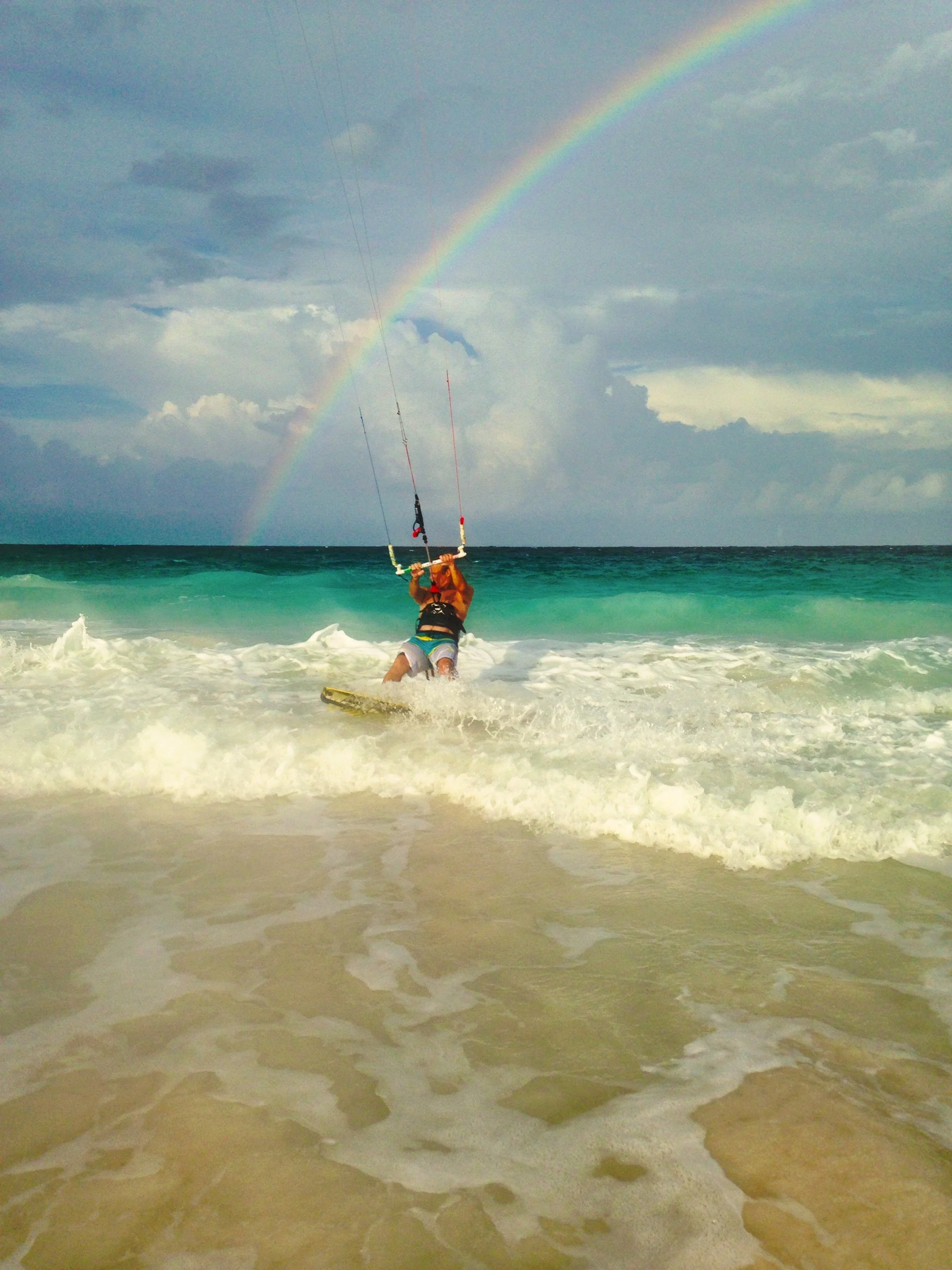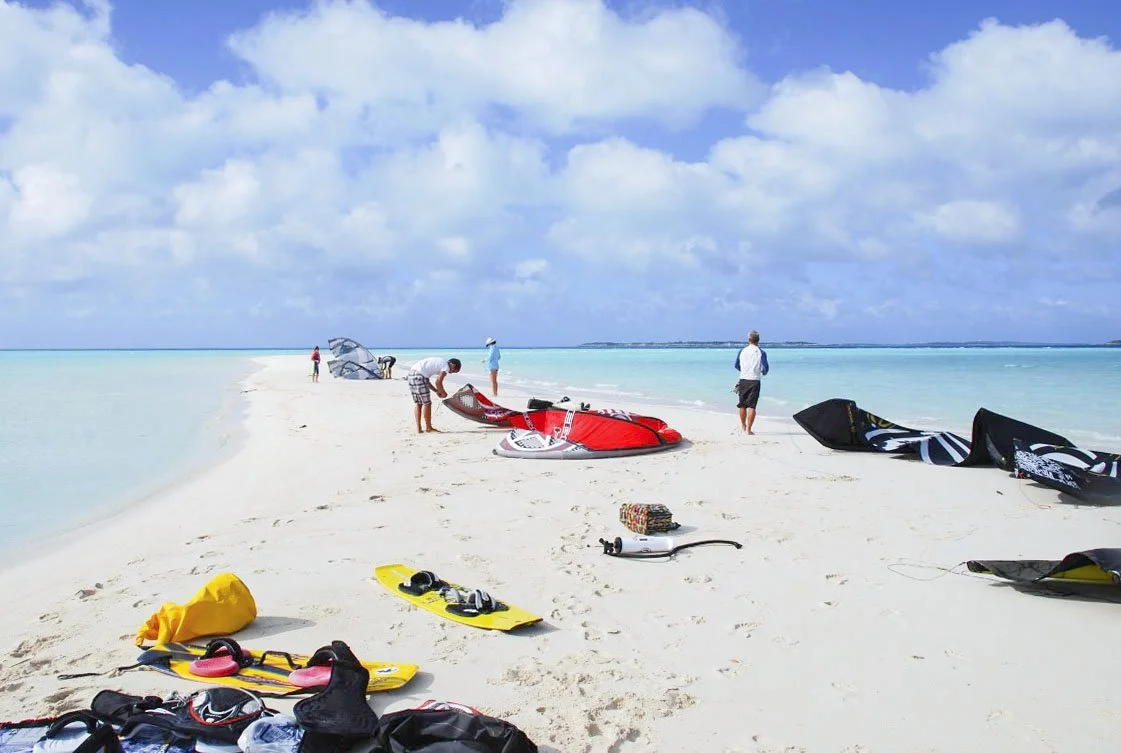Kiteboarding in the Bahamas
by Mariah Moyle, 29 October 2024
Kiteboarding has exploded into a mainstream global sport, with beaches in the US, Australia, Brazil, South Africa, and across the Caribbean packed with riders on any windy day. Honestly, it still amazes me that people don’t constantly collide with each other—the amount of kites, lines, and boards flying around can look like pure, beautiful chaos.
But kiteboarding in the Bahamas is a completely different experience. Despite our close proximity to the US, the kite scene here is still surprisingly low-key. Across our 700 islands and cays, there’s more than enough space to spread out, plus endless shallow flats, sandbars, and turquoise lagoons. On many islands, you can have an entire stretch of water to yourself, even on a perfect windy day.
The only catch? Much of the Bahamas sits along the northern edge of the trade-wind belt, so wind isn’t quite as consistent as places farther south in the Caribbean. But the upside is huge: this isn’t Maui or Cape Town. You’re not battling 30–40 knot gusts waiting to rag-doll you with one wrong move. Instead, the conditions here are relaxed, cruisy, and beginner-friendly—kiteboarding in the Bahamas leans more toward fun adventure than extreme sport.
So where do you start? Which island should you visit? And when is the best time of year to kite in the Bahamas? I get a lot of inquiries about kiteboarding in the Bahamas, which is why I finally decided to compile everything Mark and I have learned over the years into one detailed guide.
Mark kiteboarding in the Exumas
Most people use “kiteboarding” and “kitesurfing” interchangeably, but I distinguish the two because they’re genuinely different styles. I’m a kiteboarder—I ride a twin-tip, which is perfect for flat-water cruising and jumping. Mark is a kitesurfer—he rides a strapless surfboard and heads out to the reef to surf waves. Don’t worry, we still love each other.
Although both styles are possible here, the majority of riding throughout the islands is kiteboarding. The Bahamas is filled with epic flatwater spots—endless sandbars, shallow turquoise flats, and wide-open lagoons. I’ve included some videos below so you can see just how unreal these spots are, and the best part is realizing you don’t need to fly all the way to the South Pacific to experience postcard-perfect conditions.
So settle in as I share our top travel tips, local insights, gear suggestions, and a few of our favorite hidden kite spots.
Best Time of Year for Kiteboarding in The Bahamas
The prime kite season runs November through April, when cooler north winds arrive with passing cold fronts from the continental US. Because the Bahamas sits in a subtropical zone, winter can actually feel cool—average temps sit in the 70s, but cold snaps can drop into the 50s. You may want to bring a light wetsuit, shorty, or farmer John/Jane, depending on your tolerance.
At the very least, wear a rashguard for sun protection. Many kiters here also use surf hats with chin straps and even sport sunglasses—the glare bouncing off Bahamian water is no joke.
Recommended Kite Sizes & Gear
Bring your own gear. There are almost no kite shops or rental centers anywhere in the Bahamas, unless you specifically book a kite camp in Exuma, Cat Island, or San Salvador. If you want to ride, come prepared with:
Two kites if possible
Mark typically rides a 12m
I’m usually on a 10m, dropping to an 8m for strong cold fronts
Very few riders use anything smaller than a 6m–8m here
For ultra-light wind days, a big kite (we once had a 16m “beast”) can be useful, though it’s definitely not required
If you need watersports gear in Nassau, Heat Wave Surf & Swim has two locations—Sandyport on Cable Beach and Harbour Bay on East Bay Street.
Wind & Tide Forecasts
For wind, we rely heavily on Windfinder Nassau. Just note:
Nassau forecasts tend to read 5 knots higher than actual wind
If Windfinder shows 15 knots, expect closer to 10–12 knots in reality
In Eleuthera and Exuma, the forecast is usually very accurate
For tides:
Use the Nassau Tide Chart for New Providence and the surrounding islands
Eleuthera has its own tide chart
For Exuma, use the Nassau chart but subtract about 20 minutes
Kite Spots in The Bahamas
The truth is, you can pump up your kite almost anywhere and score an uncrowded session. But we do have a few favorite spots that offer especially beautiful flatwater, consistent wind, and easy access. I’ll break those down next.
Nassau (New Providence)
Nassau isn’t exactly the best kite destination in the Bahamas, mainly because winter winds usually blow from the east or northeast, and the island’s long east–west shape means most beaches sit side-shore to the wind. From the northern beaches, you’ll spend a lot of time riding out-and-back rather than cruising along the shoreline.
The best natural setup is actually in front of Atlantis on Paradise Island, but unless you’re a guest, accessing the shoreline is tricky—and the beach is usually packed with tourists.
Still, there are a few fun spots when the wind lines up correctly.
Kiting at Love Beach, New Providence
Saunders Beach
Located just west of downtown near Arawak Cay, Saunders Beach gets slightly cleaner wind than spots farther west and has a wide beach for launching.
Pros:
Wide launch area
Decent wind angles
Nearby reef creates some kitesurfable waves
Cons:
Right at the harbor entrance — watch for boat traffic, cargo ships, and cruise ships
Best wind: NE, E, NW
Go Slow Bend
A tiny spit of rock between Saunders Beach and Goodman’s Bay, often used by local riders who like to show off to passing cars. Launching is tricky, and the wind can get gusty if you drift too far into Goodman’s Bay in easterlies.
You can also ride downwind from Saunders Beach and tack back up.
Best wind: NE, E
Sandyport Beach
A small crescent-shaped beach used by riders staying around Cable Beach. It’s easy to access but has limited launch space and can get choppy.
Watch for: Boats entering and exiting Sandyport Marina.
Best wind: NE, E, NW
Jaws Beach
At the far western tip near Clifton Heritage Park is a quiet, pretty beach that can deliver surprisingly fun sessions. When swell wraps around the south side of the island, it creates playful rollers inside an otherwise calm bay.
You’ll need a rare westerly wind to make this spot work.
Best wind: NW, W, SW
South Beach / Blue Hill
On the southeast side of the island, South Beach offers the only true shallow flatwater riding in Nassau. At low tide it becomes pure sand flats; mid-tide is ideal.
South wind isn’t common, so it’s more of a special-occasion spot—but when it’s on, it’s a super fun session and great for beginners. Be warned, the beach is small for launching and there are casurinas lining the strip, so don’t get your kite caught up in the trees!
Best wind: SE, S, SW
Kiting at South Beach
Eleuthera, Spanish Wells & Harbour Island
These islands get excellent exposure to north and east trade winds, making them some of the best kiting in the country.
Eleuthera
Eleuthera’s entire eastern coastline is basically one long stretch of kiteboarding potential. Pull off almost anywhere and you’ll find space, sand, and no crowds.
Gregory Town area: Best in NE and E winds
South of Governor’s Harbour & Palmetto Point: Better in E and SE
Surfer’s Beach: Great for kitesurfing on waves
Best wind: NE, E, SE
Kiting at Pink Sands Beach
Spanish Wells
Spanish Wells has a beautiful north-facing beach with a sandy point on the western tip. The shallow water along the shore makes it perfect for flatwater riding.
The island has charming, affordable cottages and a relaxed, historic feel.
Best wind: NE, E, NW
Harbour Island
Harbour Island is a dream for both beginners and experienced kiters:
Pink Sands Beach (east side): 3 miles of stunning shoreline for cruising
Girl’s Bank (west side): Endless shallow flats for flatwater sessions
Beachgoers will definitely stop and stare—you’ll be the entertainment.
Best wind: Any (thanks to access on both east and west sides)
The Abacos
Treasure Cay Beach
Treasure Cay is one of the most beautiful beaches in the Bahamas and an excellent spot for kiteboarding. The beach stretches nearly 3 miles and offers perfect cruising conditions in east winds.
A shallow sandbar on the southeastern side adds a fun flatwater area.
Best wind: NE, E
The Exumas
The Exumas are a kiteboarder’s dream come true: 365 islands, miles of flats, sandbars, lagoons, and some of the clearest water on the planet.
You can base yourself in Great Exuma or explore by boat.
Great Exuma
Moriah Harbour (west side): Shallow, protected flatwater
Emerald Bay (east side): Great for kitesurfing on ocean swell
Island Hopping by Boat: If you have a boat—or are cruising—you’ll have access to unlimited riding spots.
BUT: be extremely cautious. Currents in the cuts can be intense. I’ve personally experienced getting swept away by the tide, and also rescued a couple who became stranded on a rising sandbar while switching gear. Never kite alone in remote areas.
Kiting at a sandbar in the Exumas
Cat Island
For a dedicated kite vacation, Greenwood Beach Resort is a fantastic budget-friendly, off-the-beaten-path spot.
Resort manager & pro kiter Antoine teaches all levels and leads downwinders. The area offers:
8 miles of rideable shoreline
Mostly onshore winds
Shallow flatwater at Port Howe (great for beginners)
The resort provides Cabrinha and North kites, boards, harnesses, and wetsuits.
It’s a simple, friendly, family-style resort—great food, honor bar, beach access, and SCUBA trips with co-manager Pauline.
San Salvador
San Salvador is remote but stunning. San Salvador Kitesurfing offers lessons, rentals, and guided sessions (IKO or PASA certification required for renting).
Stay at:
Club Med Columbus Isle
Guanahani Resort





